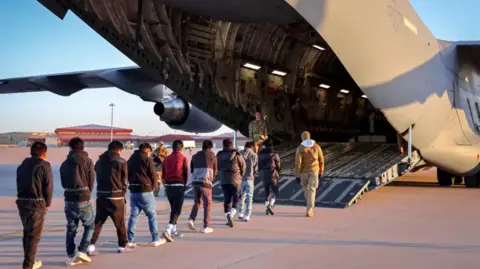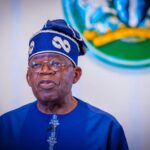A total of 11 out of 14 deported West Africans from the United States to Ghana have raised an alarm, revealing that they are still being held in detention facilities.
These ordeals were revealed by the legal representatives of the 11 deported Africans.
This revelation was also first reported by the Associated Press on September 17, 2025.
The development directly challenges statements from Ghana’s presidential spokesperson Felix Kwakye Ofosu, who claimed just a day earlier that all 14 individuals had been repatriated to their home countries.
Three of the deportees who spoke to AP claimed they were allegedly subjected to “terrible” conditions. The deportees also said that they were being held at a military camp, the Bundase camp, on the outskirts of Ghana’s capital, Accra.
They said the 11 deportees still in Ghana include four Nigerians, three Togolese, two Malians, and one each from Gambia and Liberia.
Pan-Atlantic Kompass reports that this comes after a total of 14 African immigrants were deported to Ghana on September 6, 2025.
Ghana’s President, John Mahama confirmed the development, announcing that his administration accepted the deportees because they were West Africans.
Mahama had said: “We were approached by the US to accept third-party nationals who were being removed from the US, and we agreed with them that West African nationals were acceptable because all our fellow West Africans don’t need a visa to come to our country.”
Meanwhile, information emerging on Thursday revealed that only on the 14th has returned to Gambia, his home country, according to his lawyer and U.S. court filings.
Two others are believed to have been sent to their home country of Nigeria.
In interviews with AP, the deportees said they were not told by U.S. authorities why they were being deported. They said some of them had already spent between 7 months to a year in U.S. detention and that some had won their immigration cases.
They also narrated an alleged brutal deportation process during which some of them were handcuffed and put in a straitjacket on their flight to Ghana.
“Some of us are getting sick and have malaria due to bad water and bad food,” one of the deportees said of their condition at the military camp where they said they are being held, identifying himself as a Nigerian who had lived in the U.S. for 12 years.
“They said nothing. Nobody said anything about why they were deporting me or where they were sending me,” said the Togolese among them, 28.
Also, Meredyth Yoon, a lawyer who represents four of the deportees who remain in Ghana and is litigation director at the Asian Americans Advancing Justice, told AP that her clients’ safety is at risk.
“They are afraid that the reason the Ghanaian government is insisting that they are not in the country is because they are afraid something will happen to them,” said Yoon.
Recall also that 5 out of the 14 deported Africans, including three Nigerians and two Gambians, have filed a lawsuit against the government of the United States over their deportation to Ghana.
The deported Africans in the lawsuit, accused the U.S. government of allegedly violating immigration laws and of inhuman treatment during the process.
It was gathered that the lawsuit was filed in a Washington, DC federal court on September 13.
The lawsuit accused the administration of U.S. President Donald Trump of enlisting Ghana as a “third country” to bypass U.S. immigration restrictions.
According to court documents, the deportees—identified only by initials D.A., T.L., I.O., D.S., and K.S. for safety—were granted “withholding of removal” status, a form of fear-based protection that prohibits direct deportation to nations where they face harm.
The plaintiffs also alleged that they were abruptly taken from a detention centre in Alexandria, Louisiana, in the early hours of September 5 without being told their destination. They were later flown on a U.S. military cargo plane, where they claim they were shackled and provided only bread and water during the 16-hour journey.
According to their lawyers, the deportation violated standing immigration court protections that barred their return to their home countries on fear-based grounds.
The filing stated: “Defendants know that they may not, consistent with U.S. immigration law, directly deport non-citizens to countries from which they have been granted fear-based protection. As an end-run around this prohibition, defendants have enlisted the government of Ghana to do their dirty work.”





